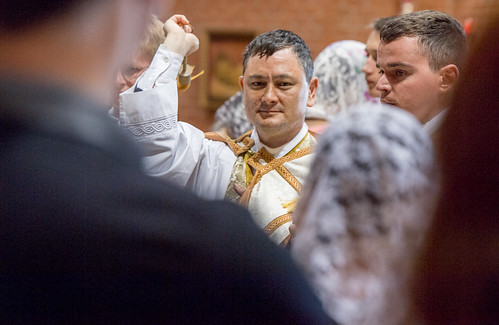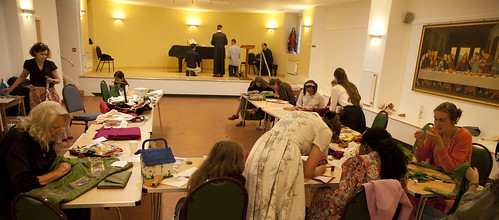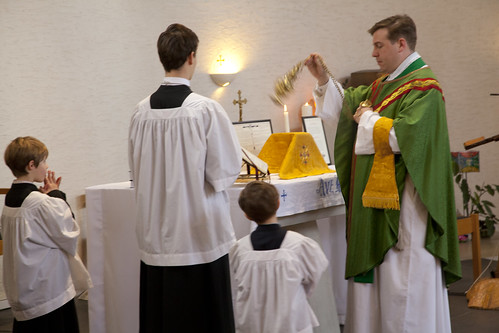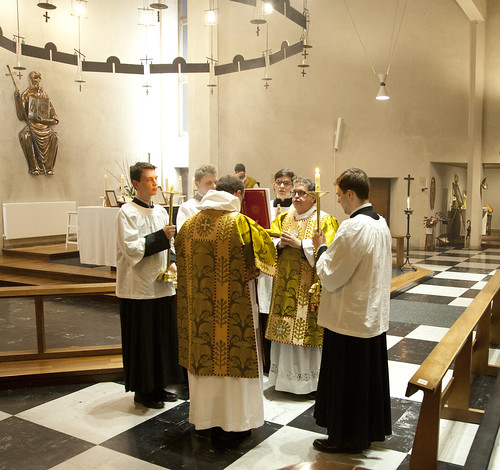Chairman's Blog
A Post-Modern Defence of Ritual: a book review
This short book (about 100 pages) could be described as a post-modern critique of the forces that are destroying both traditional societies and the remaining traditional elements of Western civilisation. It is not unique in this project, but it is a representative example of a kind of book that has become more common in recent years, and the arguments it contains are worthy of serious consideration by conservatives approaching the issues from a rather different perspective.
I am not an expert on Han’s sources—Gadamer, Foucoult, Baudrilland, Barthes, and others—so I take Han’s arguments simply as presented in this work. They display some of the characteristics of post-modernism which make it such a frustrating area to work in: sweeping generalisations, simplistic contrasts, dubious historical claims, and inconsistencies. To give an extreme example, Han appears to believe that ancient warfare did not involve projectiles (arrows and so on), which I think would have been a surprise to anyone living at the time. To some extent, one has to go along with him and see if a sound argument can be constructed out of the impassioned and intriguing elements he presents.
Support Fr Michael Rowe of Perth, Australia
Please consider donating to the (considerable) cost of making an appeal.
Fr Rowe has a special connection with Traditional Catholics in England as until Covid made it impossible he participated in the Latin Mass Society's walking pilgrimage to Walsingham: these photos are from 2017, and were taken by John Aron.
The St Anne's community has set up a GoFundMe page here.
Details from that page:
After the retirement of the benevolent Archbishop Hickey, his successor, Archbishop Timothy Costelloe in 2018 had a secret meeting on the site of St Anne's church with the Archdiocesan Vicar General, archdiocesan employees and the parish priest of Cloverdale. Fr Rowe as Rector was not informed, nor invited to the meeting on St Anne's property but only found out about it afterwards. In October 2018, by formal decree, Archbishop Costelloe merged three former territorial parishes (including the Parish of Belmont) in which St Anne’s Church happens to be located.
Pope Francis' Roller-Coaster
 |
| LMS AGM Mass 2019; photo by John Aron |
It took some time for everyone to adjust to the violent overthrow of thirteen years’ pastoral arrangements, policies, and attitudes by Pope Francis’ Apostolic Letter Traditionis Custodes (TC), not least because of the way it was promulgated, to come into immediate effect, on a Friday. The implications needed thinking through, canon law advice needed to be considered, the practical possibilities in implementation needed to be worked out. Just as things were settling down, another document came out: the Responsa ad dubia, which presented itself as an interpretation of TC, but in fact purported to add a whole lot of new obligations. The adjustment needed for this was also considerable, exacerbated by the fact that it was promulgated a fortnight before Christmas.
Bishops and papal apologists, in their different ways, have worked like Trojans to make sense of this and to put it into practice. I don’t envy either group. Just as the implications of the Responsa seemed to have been straightened out, at least to the satisfaction (if that is the right word) of various Bishops’ Conferences, official policy has been thrown once more into reverse gear. The latest decree, applicable to the Priestly Fraternity of St Peter (FSSP), puts an entirely different spin on the whole issue of the Traditional Mass and its place in the life of the Church.
Countdown Easter: Septuagesima
 |
| Ash Wednesday: closer than you think. |
My latest for Catholic Answers.
Until the reform of the calendar in 1969, Latin Rite Catholics observed a period of preparation for Lent: the three Sundays of Septuagesima, Sexagesima, and Quinquagesima. The names are derived from Latin numbers: Lent is quadragesima, “forty,” septuagesima “seventy,” sexagesima “sixty,” and quinquagesima “fifty.” It is a (very rough) countdown to Easter.
As in Lent, during this period, the liturgical color is violet, and the readings and prayers refer to our need for conversion and penance. This season is actually older than Ash Wednesday; it is discussed in the writings of Pope St. Gregory the Great, who died in the year 604. There is a similar pre-Lent season in the calendars of the Eastern churches; it was preserved by the Anglican Book of Common Prayer and in some Lutheran calendars; it has been restored in Divine Worship, the liturgy of the Ordinariate; and it is still found in celebrations of the pre-Vatican II Mass, the usus antiquior. It is the post-Vatican II calendar, in fact, that is unusual in doing without Septuagesima.
Read it all there.
London: Server Training this Saturday
26th February, St Mary Moorfields, from 10:30 am to 4pm. Booking page.
More on the venue.
Other dates for server training for the first half of the year are also confirmed@
2nd April, St Dominic's Haverstock Hill, from 11 am to 4pm (please come to the parish hall on the left of the church). Booking page. Note the new venue.
21st May, St Mary Moorfield, from 10:30 am to 4pm. Booking page.
Cause of Celebration, 2: a Successful Sewing Retreat
Cause for Celebration, 1: a reception into the Church and High Mass in Oxford
The architecture of Holy Rood is not what one might prefer but it does have an excellent acoustic and unimpeded sight-lines, and I got some nice photos of this lovely event.
The music was sponsored by the Latin Mass Society and the vestments used belong to the Society. They were purchased in memory of John Herbert and Josephine Smith, who left the Society a legacy. Please remember them, and our new recruit to the army of Christ.
Confirmations, the SSPX, and Allessandro Manzoni
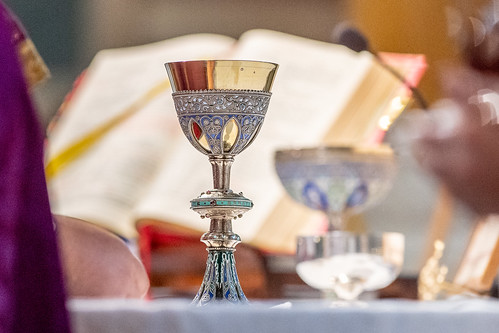 |
| Photo by John Aron |
One of the greatest Catholic works of literature, of any age and language, is Allessandro Mazoni's novel Il Promessi: the Betrothed. Among the characters is Frederick, Cardinal Borromeo, of Milan, the nephew of St Charles Borromeo; the simple village parish priest, Don Abbondio, and the engaged couple, Renzo and Lucy.
In the opening pages of the book a powerful local landowner threatens Don Abbondio with death should he marry the young couple; he has designs on Lucy. The couple attempt to force the issue, by contracting marriage before the priest as an unwilling witness. This would be recognised by the Church, under the canon law of the day, as valid but illicit.
Eventually, Cardinal Borromeo hears of the case and confronts Don Abbondio. The latter protests:
“But these persons who have told your lordship these things, have they not also told you that they introduced themselves treacherously into my house, for the purpose of compelling me to perform the marriage ceremony, in a manner unauthorised by the church?”
“They have told me, my son; but what afflicts and depresses me, is to see you still seeking excuses; still excusing yourself by accusing others; still accusing others of that which should have formed a part of your own confession. Who placed these unfortunates, I do not say under the necessity, but under the temptation, to do what they have? Would they have sought this irregular method, if the legitimate way had not been closed to them?”
It is interesting to note the forceful nature of the obligation to provide the sacraments, which the Cardinal insists on. Marriage, unlike Baptism and Confession, is not a 'sacrament of the dead': it is not a matter of spiritual life and death. And yet, all the same, the people have a right to it.
Earlier, the Cardinal had remonstrated with Don Abbondio. The latter protested:
“Perhaps I have not clearly explained myself. It was under pain of death that they ordered me not to perform the ceremony.”
“And this reason appeared sufficient to prevent the fulfilment of a rigorous duty?”
“I know my obligation is to do my duty, even to my greatest detriment; but when life is at stake——”
“And when you presented yourself to the church,” said Frederick, with increased severity of manner, “to be admitted to the holy ministry, were there any such reservations made? Were you told that the duties imposed by the ministry were free from every obstacle, exempt from every peril? Were you told that personal safety was to be the guide and limit of your duty? Were you not told expressly the reverse of all this? Were you not warned that you were sent as a lamb among wolves? Did you not even then know that there were violent men in the world, who would oppose you in the performance of your duty? He, whose example should be our guide, in imitation of whom we call ourselves shepherds, when he came on earth to accomplish the designs of his benevolence, did he pay regard to his own safety? And if your object be to preserve your miserable existence, at the expense of charity and duty, there was no necessity for your receiving holy unction, and entering into the priesthood. The world imparts this virtue, teaches this doctrine. What do I say? O shame! the world itself rejects it. It has likewise its laws, which prescribe good, and prohibit evil; it has also its gospel, a gospel of pride and hatred, which will not admit the love of life to be offered as a plea for the transgression of its laws. It commands, and is obeyed; but we, we children and messengers of the promise! what would become of the church, if your language was held by all your brethren? Where would she now be, if she had originally come forth with such doctrines?”
Today bishops and priests all over the world are steeling themselves to tell us--because this is the logical next step in the process unleashed by Traditionis Custodes--that we may not have many of the sacraments in the traditional form; that they are available from the SSPX (among others); to seek them from these would be, admittedly, valid, but, they will insist, illicit; and they cannot recommend such a step. Well, who could recommend such a thing?
It is certainly not for me to do so. I would just like to draw to the attention of these bishops and priests the words of Manzoni, placed in the mouth of the great Cardinal:
Who placed these unfortunates, I do not say under the necessity, but under the temptation, to do what they have? Would they have sought this irregular method, if the legitimate way had not been closed to them?
I would recommend those who seem so pleased with the prospect of Catholics attached to the traditional liturgical forms being driven out of the canonical structures of the Church to tear their minds away from the state of conscience these individuals may or may not have, and examine their own. Are you innocent here? Are your intentions charitable? Have you done what you could to preserve the unity of the Church?
They would do well to meditate on the words of Pope Benedict XVI:
Looking back over the past, to the divisions which in the course of the centuries have rent the Body of Christ, one continually has the impression that, at critical moments when divisions were coming about, not enough was done by the Church’s leaders to maintain or regain reconciliation and unity. One has the impression that omissions on the part of the Church have had their share of blame for the fact that these divisions were able to harden.
Support the Latin Mass Society
The LMS and the SSPX
 |
| I can't find an image of Houghton-Brown online, but he was an artist and this is by him: Richeldis founding the Holy House at Walsingham. |
The long-lost autobiography of Fr Bryan Houghton is being republished by Angelico Press. It contains a description of a famous meeting, which Fr Houghton attended himself, between the Chairman of the Latin Mass Society, Geoffrey Houghton-Brown, the President of Una Voce International, Eric de Saventhem, and some others, with Archbishop Lefebvre, in 1969. At this meeting it was agreed that Latin Mass Society/ Una Voce groups should stick to seeking permissions for the Traditional Mass from bishops and the Holy See, while the Archbishop, and the fledgling SSPX which he founded, could continue to act as he saw fit, with or without permission. (Fr Houghton was a cousin of Houghton-Brown, incidentally.)
I may say that this was not the first time that I met Monsignor Lefebvre. I had already met him (perhaps in the summer of 1969) at the Kenworthy-Browns. There had been present: Mr and Mrs Kenworthy-Brown, Monsignor Lefebvre, Mr and Mrs de Saventhem, Mr Geoffrey Houghton-Brown, Mr Vernor Miles (representing the Countess of Kinnoull) and myself. Monsignor’s lack of English was a bit of a bore, but luckily the de Saventhems, Geoffrey and I were fluent in French, and the Kenworthy-Browns understood most of it, although a bit tongue-tied. But poor Vernor Miles was still at school-French: “My aunt’s pen: la plume de ma tante.” This was perhaps rather fortunate—divine Providence. Monsignor Lefebvre wanted money to start up in England in a big way. Now, Vernor Miles represented Lady Kinnoull, who had one of the biggest Catholic fortunes in England. It had been left to her by her husband and she was childless. At the crucial moment Mr Vernor Miles was unable to understand.Anyway, the problem was: whether the Latin Mass Society should associate itself with Lefebvre or not? It was decided that the two organisations should remain divided: the LMS trying to get the hierarchy to admit the old Mass; Lefebvre producing the old Mass in spite of the hierarchy. I felt quite sure that this was the right decision.
Learn Latin and become a citizen of Europe
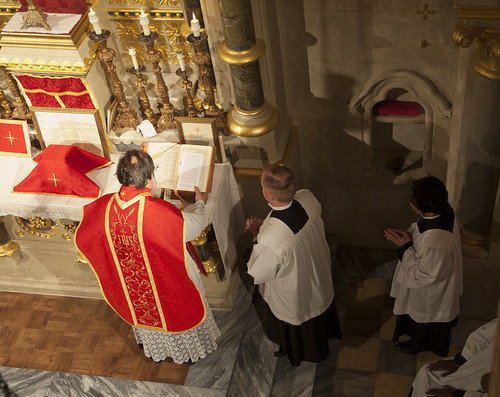 |
| Reading the Epistle: Fr Gabriel Diaz at Corpus Christi, Maiden Lane |
And here is an unexpected, but perfectly logical, new reason for learning Latin and Greek, which appeared in the press before the Christmas rush but is worth repeating.
Jean-Michel Blanquer, France's Education Minister, is re-introducing the study of Latin and Greek into France's professional schools: it will be possible to study them as part of the 'technical' baccalaureate. This is part of an international effort to 'strengthen the EU', alongside Italy, Greece and Cyprus.
Here is The Times, here is The Telegraph: both paywalled; here's a parallel report from RT.
It is part of President Macron's 'war on woke', apparently. Blanquer ridiculed the idea that teaching Latin promotes racism, which, predictably enough, has found a home in the once-elite University of Princeton.
Obviously one has to reject such an idea if one wants to promote the study of the Classics. But Blanquer's motivation is about putting young people in touch with the common cultural roots of Europe.
A similar idea was recently expressed in Le Figaro, where Sundar Ramanadane suggested that Latin be the language of the EU's institutions. Seriously! After all:
Latin carries within it two millennia of a culture as varied as its authors were: it was the link between a Europe of minds who, through time and across space, have debated, disputed, but always with a common identity as a backdrop. Latin also structured the languages we speak today in Europe, in their grammatical construction or in their lexicon: it crosses national boundaries.
...
Finally, a Latin-speaking Europe would symbolize the strength, rigour, and will to power (something that Europe has recently attempting, albeit timidly, to assume), the will to unite many peoples around it. It would then be the language of an entity which would have another ambition than that of being a cartel of states representing, for the largest of them, just over one percent of the world's population.
So 'Latin deserves to become the language of Europe again.'
He concludes:
If Europe one day aspires to develop a European identity beyond national characteristics, and to be something other than a grant-giver and a great regulator, (things that are not criticized in themselves), it must acquire a language which, unlike this laboratory language that is Esperanto, has a rich history, and reflects a historical legacy in which the peoples recognize themselves and under which they can consider uniting.
Support the Latin Mass Society


